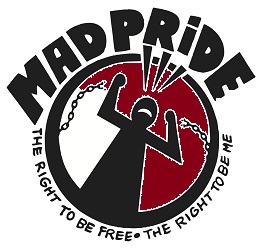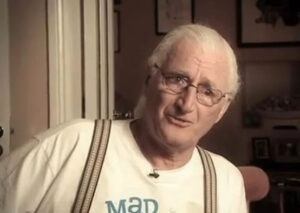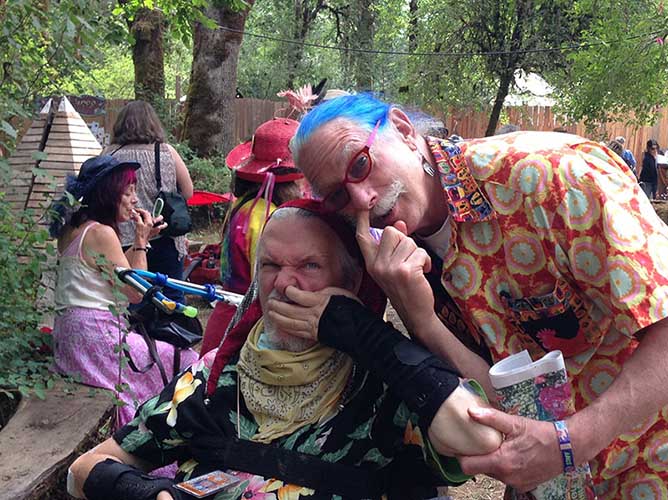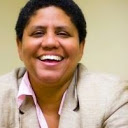The Mental Health Subcommittee for a major cross-disability organization has recommended supporting both Disability Pride Month and Mad Pride Month in July. As a psychiatric survivor quadriplegic, the bridges between Mad Pride and Disability Pride are crucial to my literal “lived experience.”
The National Council on Independent Living (NCIL) is celebrating its 40th anniversary as one of the largest and longest-running grassroots advocacy nonprofits run by and for people with disabilities. NCIL’s Mental Health Subcommittee unanimously voted on 28 June: “We recommend to the NCIL board & others to support both Disability Pride Month and Mad Pride Month: Both are July!”
The Mad Pride Movement is Alive and Growing

Today is July 14, Bastille Day, which psychiatric survivors and mental health consumers have used for decades as a unifying day to protest human rights violations and celebrate the human spirit. This date is a good time to reflect on Mad Pride.
Mad Pride is an informal, international mass movement, originating in Toronto, Canada and London, England in the early 1990s, celebrating our diverse identities as people labeled “mad.” Some years Mad Pride festivities, marches, parades, gatherings, etc. have been frequent, other years not so much.
Mad Pride Switzerland just held its Mad Pride Parade in Bern last month, on 18 June, as they have in several past years. More than 1,000 participants filled the streets for two blocks, complete with three bass drums, snare drums, whistles, balloons, matching umbrellas, signs, and floats. Check out the festivities in this video: https://youtu.be/G6XyX6un6MQ
On 28 May 2022, a Mad Pride March was again held in Mexico City. The sponsors were la Redesfera Latinoamericana de la Diversidad Psicosocial & la Red Orgullo Loco México. You can email the organizers here: [email protected]. Mad In America covered a Mad Pride Mexico event in 2019: https://www.madinamerica.com/2019/09/mad-pride-rises-in-mexico/
Mad Pride Chile (Orgullo Loco Chile) recently held a Zoom discussion on 22 June about the impact of electroshock lived experience on human rights. Mad Pride Chile runs an Instagram page here: https://www.instagram.com/orgulloloco_chile

In the past, Ireland has had some of the biggest Mad Pride events, largely because of the leadership of Cork poet and psychiatric survivor John McCarthy [1950–2012]. You can find videos on YouTube about Mad Pride Ireland festivals in parks throughout Ireland. John often talked about the “normality of madness and the madness of normality.” David McCarthy, John’s son, wrote to me, “There is an event in Cork on July 17th, 2022, Joy in the Park. It is in memory of a young lady lost to suicide last year. They are copying our Mad Pride Day format and will have the John McCarthy Memorial Stage, which is lovely. It’s comforting to know his memory still touches so many people!”
https://www.echolive.ie/entertainment/whatson/arid-40880891.html
Why MAD Pride Month in July?
Mad Pride events have been held throughout the year. For instance, Mad Pride Seoul in Korea chooses World Mental Health Day, October 10, for their myriad performance and parade events. But, MindFreedom Oregon, an Affiliate of MindFreedom International, for several years has called for July to be Mad Pride Month as a special focus for mad organizers.
The month of July has many connections to the movement for mental health consumers/psychiatric survivors (C/S), here are a few:
In 1981, some activists in New York State were looking for a day to hold an annual protest in Albany of the mental health system. At first, they were about to choose July 4, but psychiatric survivor Myra Kovary encouraged them to choose a non-US-centered date, Bastille Day, July 14. C/S movement groups still often choose events on July 14. In 2008, Myra described her experience here: https://mindfreedom.org/kb/bastille-day-and-mh-liberation/
When MindFreedom International looked for a week to celebrate the concept, invented by Martin Luther King, Jr., of “creative maladjustment,” they chose a week from July 7 to 14.
By happy coincidence, the birthdate of one of the most amazing psychiatric survivor activists in history, Leonard Roy Frank [1932–2015], is on July 15.
As we have learned more about the often-obscure history of the Mad Pride Movement, Wikipedia carried an interesting fact about one of the first known psychiatric survivor groups: “On 7 July 1845, Richard Paternoster, John Perceval and a number of others formed the Alleged Lunatics’ Friend Society.”
And in Oregon, of course, the infamous Oregon Country Fair (OCF) is always shortly after the 4th of July. MindFreedom has held Mad Pride events in the heart of OCF, the Community Village, for many years, and will again this year. Dissident physician and psychiatric survivor Patch Adams has often spoken, but will not be at the fair this year. In the past, the late dissident psychiatrist, Carl Hammerschlag, has also joined Patch.

So, July was the obvious choice for Mad Pride Month.
Disability Pride Month, Too?
Meanwhile, the disability movement was engaged in a wonderful simultaneous action: Naming July as Disability Pride Month. The Americans with Disabilities Act (ADA) was signed into law back on July 26, 1990. To celebrate, Boston, Chicago, New York City, and others began holding Disability Pride marches and parades. Because the ADA was signed in July, when disability groups decided to devote a month to Disability Pride, again the obvious choice was July.
I can easily imagine someone thinking, “What is there to be proud about when you have a disability? Proud to lose a leg? Proud to go blind?” Disability Pride does not mean every impairment one might experience is somehow splendid. Here is the description of disability pride from the organization, AmeriDisability: “‘Disability pride’ has been defined as accepting and honoring each person’s uniqueness and seeing it as a natural and beautiful part of human diversity.”
When I broke my neck one decade ago, I drew upon the lessons I learned about empowerment from decades in the psychiatric survivor movement. I am proud of applying these skills when I needed them most. There are many reasons to have Disability Pride: Our resilience, the amazing global disability community, the uniqueness of every human being…
Why Mad Pride?
I am a psychiatric survivor who was involuntarily placed in psychiatric institutions five times. I experienced forced psychiatric drug injections on a bare mattress in solitary confinement. After I finally got free of psychiatry, I spent decades rebelling against and resisting the bizarre, ridiculous, unscientific, goofy, demeaning labels found in the Diagnostic & Statistical Manual of the American Psychiatric Association (DSM). Twenty years ago, I helped lead a national hunger strike that challenged psychiatry’s medical-model basis for labeling. I still, after 46 years of being a psychiatric survivor activist, fight goofy psychiatric labeling.
So, some might ask, “If you rebel against labels, then isn’t ‘Mad Pride’ hypocritical?”
No. The psychiatric establishment generally runs away from the use of words like “mad” and “crazy.” Whole books could be written on the topic of language, but just let me say that the only love that I would consider real is being “madly in love.” Personally, since there is no official definition of the word ‘mad,’ I like what some activists suggest: M.A.D. stands for Marginalized And Disempowered.
Social change movements led by marginalized people must build bridges to all communities of disenfranchised people, such as LGBT and BIPOC. Sadly, like many other social change movements, our field needs more diversity. White males like myself tend to be over-represented. Increasing diversity and inclusion is a high priority for many C/S movement groups. What about building bridges to the disability movement, one of the biggest in the world?
Our liberation movement of psychiatric survivors and mental health consumers is now more than 50 years old in the US. For those truly interested in global nonviolent revolution, which I consider a necessity, we need people power, quickly. On June 14, 2022, in preparation for bringing up psychiatric human rights with the United Nations, there was a Side Event on “Remedy and Reparation for Institutionalization.” This event clearly emphasized the need to connect the C/S movement and the cross-disability movement to build the people power we need for true deep change. You may view this Side Event here: https://youtu.be/UOSp7I9z0Nk
Psychiatric Survivors and the Disability Movement
One of the surest absolute connections between the psychiatric survivor movement and the disability movement, is that we human rights activists claim that nearly every type of psychiatric oppression and goofy label results in disability. This should be obvious, because oppression causes trauma. And further, electroshock causes massive head injury and memory loss. That sounds like a disability to me.
I am ashamed that a few of my fellow psychiatric survivors have a kind of “brain bigotry” on the issue of the disability movement, also known as ableism. These psychiatric survivors say that because their psychiatric labels are fictional, they cannot and should not be oppressed and forcibly treated. Hey, here’s a concept for you: Whether or not your label is goofy or true, you do not deserve oppression!
Many of us psychiatric survivors point out that a lot of our psychiatric labels are fictional, like the unicorn. But folks, even if you are missing a limb and are obviously disabled, you deserve human rights, choice, dignity, respect, humane alternatives, peer support, and voluntary healthcare.
Disability Leaders: Watch Out for Sanism
Thought-leaders in the disability movement, such as activists, authors, academics, back starting in the 1970s, often spoke about the “social model of disability” replacing the domination of the medical model. In other words, attitudes and structures in our society may often be the actual origin of disability.
This diversity of perspectives in what has been thought of as the “physical disability movement” is even more important in building a true cross-disability movement which welcomes those who have experienced a mental disability label. Some of us in the consumer/survivor (C/S) movement choose to take psychiatric medications and agree with our diagnosis. Others are disgusted by both psych drugs and psych diagnoses. Still others reject and accept different elements of their psychiatric treatment. The common framework here is choice and human rights.
Unfortunately, I have seen some disability leaders falsely believe that when an activist criticizes psychiatric drugs, they are somehow pressuring others to reject their psychiatric care. Indeed, some individuals flatly reject the whole mental health industry. However, almost every C/S group I’ve seen embraces choice, human rights, and diversity. In my experience, individuals who choose to take psychiatric drugs are often totally comfortable and accepted in C/S advocacy organizations. We need to wrap our minds around the complexity of individual choice. Again, we unify around human rights.

Dissident mental health counselor, Ron Unger, addresses the importance of embracing the seeming paradox of sometimes rejecting what is called “madness,” and sometimes celebrating it. He said that, unlike Gay Pride (he himself is in a gay marriage), Mad Pride is more complex, and it is difficult to know where to always draw the line. Ron told me, “It is a tricky topic, since some people are definitely proud of the mental states that are called mad, while others see the madness itself as a tragedy but are proud of their resilience etc. around it. So I was trying to address the full range of meanings around it and make sense of them.” Ron gave a webinar last year for the International Society for Psychological and Social Approaches to Psychosis (ISPS-US), entitled “Exploring the Promise and the Pitfalls of Mad Pride,” which you may view for free here: https://youtu.be/WSbtEJuWQdY
You Can Be a Leader in Both Mad Pride Month & Disability Pride Month!
It is totally OK if you personally choose not to celebrate Mad Pride Month or Disability Pride Month. Perhaps there should be a “Normal Shame Month”? Let me know if anyone organizes that, I’m too busy.
However, many of us do want to celebrate our differences, both in Mad Pride and Disability Pride. I will not impose a psychiatric label on another person unwillingly. But please do not try to impose the label of “normal” on me. What is generally called “normal” is wrecking the planet’s environment and threatens life on Earth. What is generally called “normal” is actually, from my perspective, the worst, most dangerous altered state ever.

As a psychiatric survivor with extreme physical disabilities, I love the idea of building bridges between Mad Pride and Disability Pride. Think of one of the key leaders in fighting the climate crisis: Greta Thunberg. When Greta was younger, she and her family wrestled with many severe mental and emotional problems, including periods of not eating, isolating herself with just a few close family members, screaming and crying for long lengths of time, etc. Greta personally accepts the diagnosis of “autism.” But Greta’s perspective is that being “on the spectrum” is her “superpower,” because her uniqueness helps her see through the web of lies that seemingly control “normal people.”
One aspect of the climate crisis that I have found particularly frustrating is that the general public, perhaps because they embrace the old-fashioned linear reductionist paradigm, does not seem to understand the complexity of tripping many cascading feedback loops. Especially if this idea is new to you, I highly recommend viewing the five short documentaries narrated by Richard Gere. Greta found these so important that she and the Dalai Lama introduced them. View these videos here: https://feedbackloopsclimate.com/
July is now hosting a third related theme: BIPOC Mental Health Month. Each year, the nonprofit Mental Health America “develops a public education campaign dedicated to addressing the mental health needs of Black, Indigenous, and People of Color (BIPOC).” More info: https://www.mhanational.org/BIPOC-mental-health-month

The NCIL Mental Health Subcommittee, led by African-American community organizer Yvonne Z. Smith, has become one of the main critical intersections to build cross-disability bridges between the disability & mental health consumer/psychiatric survivor communities.
With the support of MindFreedom International and their Executive Director, Ron Bassman, this call for supporting both Disability Pride Month and Mad Pride Month in July will go out far and wide.
You can find resources and links about both Mad Pride and Disability Pride on my personal blog here: https://davidwoaks.com/bridging-mad-pride-disability-pride
I also look forward to comments, ideas and discussion on my personal blog.












Comments are now open on this blog! I love building bridges between Mad Pride & Disability Pride. What are some of your experiences? How do you show your Mad Pride? Are you in both camps like me? Your comment of any length is appreciated.
Report comment
My MIA blog inspired some folks to look into details. Here is one I have always been curious about: Were there really psychiatric survivors freed when the Bastille was stormed? Here is Jillian’s article:
Actual Psychiatric Survivors Were Freed During the Storming of the Bastille!
Remember James F.X. Whyte and Auguste-Claude Tavernier!
By Jillian
Although a powerful symbol, the Bastille in Paris wasn’t the functional center of state terror it had been in previous decades by the time French revolutionaries beset it, on 14 July 1789. Only seven prisoners were actually liberated from the Bastille. Two of these prisoners were described as “lunatics.” Their stories are interesting and informative from human rights and historical perspectives.
One of the psychiatric prisoners freed that day is named by some as “James F.X. Whyte.” His full name is given several different ways, all very long:
Jacques François Xavier Whyte or
Seigneur De Malleville or
James Francis Xavier Whyte
He was a captain of the Irish Brigade in the French Army who apparently experienced a mental breakdown in 1781. His family had him declared insane and he was committed, eventually arriving at the Bastille in 1784. It is said he believed himself to be Julius Caesar, Saint Louis, or possibly both. After being freed subsequent to the events at the Bastille, he looted the home of one of his sympathizers and was then committed to the “lunatic asylum” at Charenton where he renewed his previous acquaintance with the Marquis de Sade.
Whyte made quite an impression on observers. He dressed in a long red cape and had an unkempt white beard three feet long. His uncombed hair was similarly long, grown past his knees, and described as either divided into two parts or matted in a net. Whyte seems to have viewed people and events around him with perpetual curiosity, interest, and astonishment. Consistent with his reported belief that he was Julius Caesar, at times when Whyte was paraded through the streets as a “lunatic,” he waved to the crowds, thinking they were there to praise him.
Auguste-Claude Tavernier was a different sort of man. In his youth, he fell out of favor with his family and was imprisoned at their request and expense for being lazy and making trouble (“excessive idleness and libertinage”). This state of affairs went on for some time, until a fellow inmate accused him of plotting to kill the King. The court case was complicated and was never actually resolved. At the age of sixty, he had spent most of his life in prison when he was suddenly liberated by the events of 14 July.
Tavernier is described as both clever and “unstable,” although particulars of this instability were not easy to find. From the easily-available information, it simply seems his family found him embarrassing and there were credible but unproven accusations that he plotted against a widely unpopular King. Tavernier is said to have written some interesting things during his long incarceration, particularly regarding arbitrary imprisonment. After the storming of the Bastille, he was rounded up and sent to the asylum at Charenton along with Whyte. He was eventually released in 1795, but after that no mention of him is made again that I could find.
For more information, here are some links:
Origins and description of Whyte:
https://www.irishtimes.com/opinion/an-irishman-s-diary-1.702390
Information on Bastille, Whyte, and Tavernier:
http://rodama1789.blogspot.com/2015/10/the-prisoners-of-bastille-in-1789.html
A man’s brief article about Whyte, his distant relative:
https://nwhyte.livejournal.com/3226791.html
Artist’s fanciful portrayal of Tavernier:
https://www.bridgemanimages.com/en/noartistknown/title/notechnique/asset/4841613
Report comment
As noted at the bottom of the MIA blog, I have created a toolbox for folks who are interested in Mad Pride and/or Disability Pride. This is not meant to be comprehensive, but it’s a start. FInd out about events, links, resources:
https://davidwoaks.com/bridging-mad-pride-disability-pride
Report comment
Thank you so much for this excellent blog, David.
I loved finding out about the existence of the “Alleged Lunatics’ Friend Society”! And I’m so glad you included the link to the United Nations session on “Remedy and Reparation for Institutionalization,” so ably (pardon the expression) hosted by Tina Minkowitz.
Your determination and persistence in advocating for global nonviolent revolution are inspiring. It seems like a no-brainer (whoops!) that crazies should partner with the disability movement as well as those fighting for women’s rights, racial justice, prison abolition, poverty reduction, queer rights, and so many other necessary remedies to “normality” – since, as you so rightly point out, “What is generally called ‘normal’ is wrecking the planet’s environment and threatens life on Earth.”
I also love that you refer to psychiatric labels as “goofy”; emphasizing the ridiculousness rather than the evil of psychiatry is such a smart way to help “normal” people wake up to the incredible levels of disability caused by psychiatry. And how right you are to say that “Whether or not your label is goofy or true, you do not deserve oppression!”
I certainly do not see myself as belonging to “the consumer/survivor movement,” since this use of the word “consumer” (like its much more common use in replacing the word “citizen” or “person” everywhere, thanks to our society being all about consumption) kind of makes me want to barf – but of course it’s always good to be reminded that people like me share with “mental health consumers” a “common framework [of] choice and human rights.”
I am also very far from being a fan of the paradigm of Pride, and am sad about its having replaced the concept of liberation (as in gay liberation – the long-forgotten ancestor of 2SLGBTQ[etc]. Pride). And yet I appreciate Ron Unger’s statement that “some people are definitely proud of the mental states that are called mad, while others see the madness itself as a tragedy but are proud of their resilience, etc. around it.” Similarly, although “autism spectrum” ideology does not do anything for me personally, I love Greta Thunberg’s view that being “on the spectrum” is her “superpower.”
Hurray for “seeing through the web of lies that seemingly control ‘normal people.’” Hooray for activism and humour! Hooray for you, David Oaks – thanks for being there, through thick and thin.
Report comment
Thanks much, Irit, for your comment and your decades of creative communication about our movement. Two quick replies:
If you have a suggested name for our “movement,” wonderful… The reality is that we psychiatric survivors definitely do need bridges to the many folks who use the current mental health system. In fact, at the Alternatives Conference, which I have attended many times, I almost always found tremendous support for liberation and also a warmth and tolerance that was incredible. For me, the slash in consumer/survivor is a bridge. One may be one or the other, but we need to bridge.
Second, I support both Mad Pride and Liberation!
Forward to a global nonviolent revolution!
Report comment
Thanks for the great article, David! Mad Pride is very important to me as well and we definitely need things like Mad Pride Month along with Disability Pride.
It was so cool learning about all the Mad Pride/Orgullo Loco organizing done across Latin America when I met Pao, the W.I.L.D. delegate from Peru. Truly the movement is once again growing.
The “I’m just mentally ill” crowd and the “I’m totally normal” crowds can both have their things– But boy is it nice to be able to celebrate our differences without giving in to psychiatric oppression! And as a neurodivergent person, I can’t afford to be in denial about such differences.
I like that you once again mention Greta’s “superpower.” When we truly embrace both Mad Pride and Neurodiversity, we will find so many people once thought by mainstream society as incompetent or “too crazy” for leadership to be some of our most valuable folks for all movements for justice. The spirit of “creative maladjustment” lives on!
Report comment
Ian, working with you for years has been a real gift. It is wonderful that you support Mad Pride and Mad Pride Month. I’d like to draw attention to folks to check out your July Is Mad Pride Month page on Facebook: https://www.facebook.com/MadPrideJuly
I hope you like and comment this page.
Also, you encouraged me to work with you for a Reddit discussion page on Mad Pride. Reddit is very easy to join, and I hope folks have a great discussion there.
It would be impossible for me to thank you enough, Ian, keep it up!
Report comment
Madness is my cloak of invisibility. Madness is my boots of invincibility. Madness is my liberation. Madness sets me free.
I do not want to be proud of things I should have had all along. I am not proud of my fair hair. I am not proud of my elegant hands. I am not proud of my beating heart. I am not ashamed of any of those so why should I be the opposite in pridefullness, given that I do not buy into society’s shame. Pride often seems reactionary against stigma.
Stigma reassures me I am going the right way. The HONEST way. The uncomfortable middle path way in a world where everyone want you to “side” with them.
But David, I love the notion of CELEBRATION, especially of madness.
I do feel schizophrenia is a sort of ethnicity. A culture. And because it is and because it is ripe for CELEBRATING, even as maverick freedom fighters, every “side” wants to shun what it is. This is because everyone has their own notion of freedom and what it SHOULD look like.
If everyone simply attended to their own individual freedom needs and stopped insisting on “consensus rules” about what freedom should be for complete strangers then we would all feel free as the birds.
I like what you are doing dear David. I like it a lot. I do not agree that all Pride movements should band together. What is that for? Power? I loathe power. Humans like power because they think it means freedom. But power is just the denying of frèedom to others. No animal bothers with power. Yet all animals as individuals know freedom.
The banding of Pride movements all together is an attempt at forming a mass “consensus opinion”….one that will become another mass wave of bullying.
Security is not found in “consensus opinion” unless that consensus agrees that your individual freedom of choice to be innocuously whoever you are COMES FIRST.
If your free choice to be YOU is harmless and does not put a spot or bruise or pain of abuse on another person then you are free to be free and free to CELEBRATE how your freedom makes you feel.
I would prefer Mad Pride to rename itself as Mad Celebration. But that is all I would change. Keep up the good work, David.
And I like Imrit’s comment too. Very honest and true.
Report comment
My understanding is that one of the origins of “Mad Pride” is that several psychiatric survivors were watching a Gay Pride parade in London, and got inspired. Toronto also lit the spark. Yes, celebrating is a positive development, giving thanks for our differences that are often so positive in unexpected ways. In the spirit of choice, totally OK if someone chooses not to use the word “pride.” But, many folks in Gay Pride events and Mad Pride events do choose, and our movement celebrates choice!
Thanks again.
Report comment
Divining rods. I never thanked her.
Report comment
Thank You David for this amazing blog . Within the last 4 years when I was injured physically in a car accident , psychiatry twisted things, to make out like the priority was psychiatric treatment. Since I was a psych survivor which I should never have revealed in the hospital it was easier for them to do. It seems the most powerful person in a hospital is a psychiatrist . They have no compassionate sense of humour only a sadistic one.
With some help from a traditional naturopath I was able to find liberation again . Now I’m again struggling to free myself entirely from the tentacles of psychiatry . There was some time I couldn’t sleep enough , while I was going through some difficult life stress’s. I feel confident I will succeed again even though psychiatry’s oppression’s are not easy to overcome.
One of the highlights of my life was demonstrating against electric shock with you and other activists in Eugene Oregon some years ago .
David it seems you’re always thinking about doing things better. Certainly we don’t deserve oppression and it’s obvious many different groups under oppression should ideally work together for mutual surviving and thriving .
I will continue to look at the numerous informative links you have so generously provided and consider you to be a living natural treasure activist .
Report comment
Thanks much, Fred. Wonderful to reflect on our shared memory of protesting electroshock a few years ago together here in Eugene, Oregon. We started at the Free Speech Plaza and then ended up in Kesey Square.
Sorry you’ve had such challenges, but sounds like you are on the upward trajectory, please stay there. MAD PRIDE!
Report comment
Thanks David, I enjoyed the article, and also your follow up comments.
I thought it was interesting how you mentioned that “Whyte seems to have viewed people and events around him with perpetual curiosity, interest, and astonishment.” One mental state (that some might call madness) that I’ve been proud of is the ability to see things with fresh eyes, from way outside of normality.
Gary Warne is no longer with us, but he was a key founding member of the San Francisco Suicide Club, a not very normal group that I was part of as a young person. He wrote a very short essay called “The Clown at Midnight” https://www.trippingly.net/burning-man-musings/the-clown-at-midnight-by-gary-warne which touched on some of that. You can read more about Gary at https://www.trippingly.net/burning-man-musings/gary-warne
Report comment
Thanks, Ron. Hope folks noticed in my blog that I credit your fascinating webinar on YouTube. I highly recommend that. There are no simple answers, but this helps us embrace the complexity of paradox.
Your support for states of curiosity and wonder remind me of one of the most famous fictional characters in our field, Don Quixote. Certainly, he brought the old view with fresh eyes looking at the so-called modern world. One of the best books I’ve read on our topic is by feminist anthropologist Ann Goldberg, “Sex, Religion, and the Making of Modern Madness.” Wonderful perspective, and points to the value of inquiry and open dialogue when folks have challenges. I especially enjoyed the story about the mill owner who was going through extreme issues.
Thanks for the “Midnight Clown” info. I have started to look at these links and seems helpful.
I love that we are both in Eugene. We ought to have a chat with Chuck in our backyard while the weather is nice. Let us be in touch.
Report comment
Great article.
I don’t really think of MAD as being “Marginalized and Disempowered”, for me, it’s something more along the lines of “Magnificent and Dynamic”.
Best reason for embracing my madness: you have all these Nami-ites running around saying that to call somebody mad is to be derogatory while to call somebody “mentally ill” is some kind of act of “mercy”. Pardon me, if I cling to my skepticism. I, frankly, don’t buy it.
Mad humility? Excuse my arrogance, but that really would be, let’s say, “counter intuitive”. When somebody puts me down, I don’t have to, therefor, put myself down. If I did, who gets something out it? Well, you can be danged sure it isn’t me. Nope, for me to get a slice of the pie, that would require a bit of, in the face of massive opposition, Mad pride.
Chen up. We can and will win.
Report comment
Frank, your support as a friend over the decades is so much appreciated, and more treasured than ever. Hope you are doing well. Yes, while I have definitely found some individuals members of NAMI to be supportive of human rights, because of their funding they have nationally (obviously) been very biased toward the dominant medical model. People should know it took a US Senate hearing to uncover the private fact that most of NAMI’s funding at that time was from Pharma.
What I have found helpful in challenging that bias, is working with other marginalized communities. For example, many disability leaders understand the necessity of empowerment. After all, their main slogan is: Nothing about us without us! Yes, Mad Pride is different from, though allied with, other marginalized groups. But when cross-disability leaders support us, it really amplifies us. Though as I point out in the blog, unfortunately a few leaders do not “get it.”
My wonderful wife, Debra, read your remarks here to me and she really really loved the idea that MAD stands for Magnificent And Dynamic. Perhaps others have supportive acronyms? Thanks again, let’s get more in touch soon. I love supporting activism in Florida. Even a few of us working together can make a big difference.
Report comment
Thank you for your blog which is well-reasoned and fair. I appreciate your point of view even though my experience of the mental health system has been very different. As you say, we need to respect the point of view of everyone because human experience is so different from person to person. And, thanks for calling out the ableism in the mad pride movement. That needed to be said.
Report comment
Rev. Barbara Meyers, thanks for posting this supportive comment. More than a decade ago, when I read materials produced by you, I very much enjoyed reading a sermon supportive of our MindFreedom campaign against involuntary electroshock over the expressed, clear wishes of the subject.
Some readers may not know, that such atrocities are “legal” and practiced in the USA and many other nations. Forced shock in the US may be “rare,” but even one is too many. And some forced shock is court-ordered on an outpatient basis, incredibly.
Bottom line, even folks in our field with very different experiences & perspectives can unite on many human rights issues. For years, I went to the Alternatives Conference. I only met one individual who opposed our human rights approach. But even he was actually very friendly and broke into tears with me at one point: The late Fred told me about how when he was in the institution he ALMOST got involuntary electroshock, and that still traumatized him.
Thanks again for your unifying statement & you’re being so open to dialogue about unifying principles.
While of course, all faiths & non-faiths are welcome to this work, I have very much appreciated being a Unitarian Universalist (UU) this past decade. Rev. Barbara is a key national UU leader on improving the lives of folks diagnosed with either mental or physical disabilities. Thanks!
I own the kindle version of your recent book, Held, and I look forward to reading this soon.
Report comment
THIS MONTH IS ONE YEAR LATER: July 2023. I would love to share your new comments to celebrate both DISABILITY PRIDE MONTH & MAD PRIDE MONTH. All perspectives, pro and con and mixed, are welcome… just please follow the guidelines for Mad In America comments.
How will you celebrate? What challenges are there building bridges between these two movements? How do you have MAD PRIDE?
Report comment